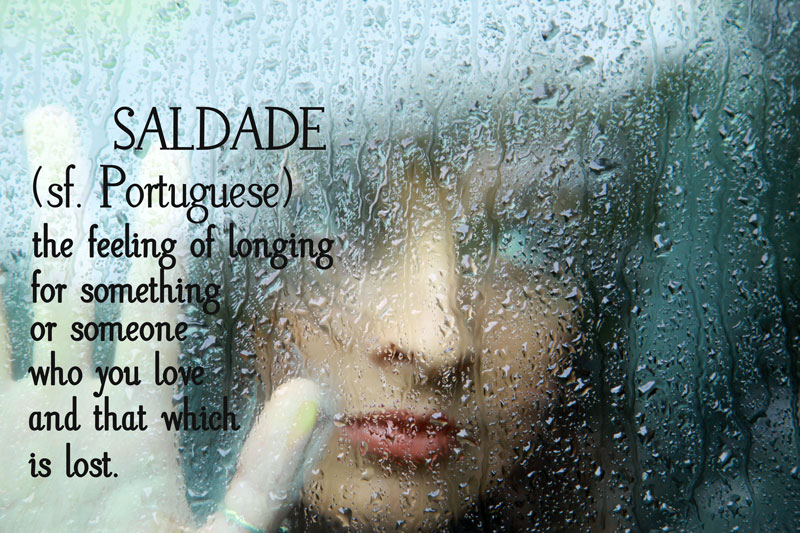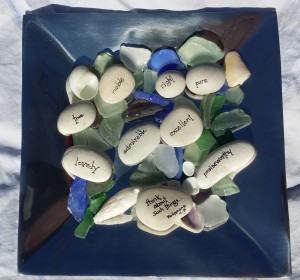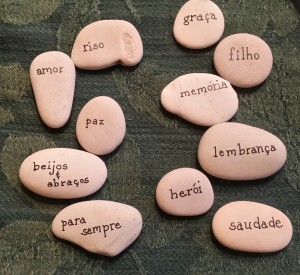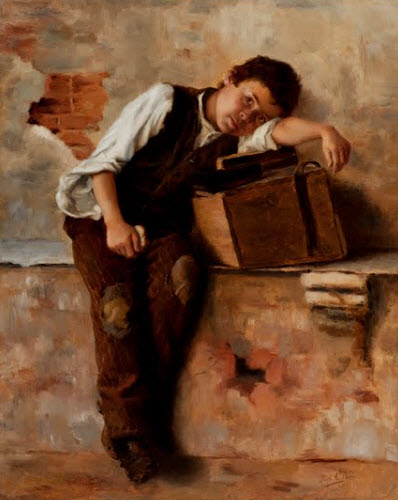
A woman stopped at my Pebbles of Peace display at my boutique table last week. The Pebbles of Peace is a collection of smoothed stones, shells, and sea glass, themed around the “Whatever” Scripture from Philippians.
 “I like these,” a woman said to me. “But do you ever make custom sets?”
“I like these,” a woman said to me. “But do you ever make custom sets?”
I told her for the same price I would put words of her choice on the stones. As she wrote her words, curiosity got the better of me.
Laughter, love, peace, xoxoxo, forever, grace, child, memory, remember, hero and saudade.
“Tell me about the last word,” I said. “Saudade.”
“It’s a bit like the English word, ‘missing,’ except that is not the definition. It’s Portuguese. More like ‘longing.'” This led to my asking if she was Portuguese.
She was.
“How about I put the English words on one side and Portuguese words on the other.”
She loved the idea and I made a set for her. And I’ve learned some Portuguese. Our ‘forever’ is two words – para sempre, that our XOXOXO has an order, too, in how you write it in Portuguese.
- laughter – riso
- love – amor
- peace – paz
- XOXOXO – beijos & abraços
- forever – para sempre
- grace – graça
- child – filho
- memory – memória
- remember – lembrança
- hero – herói
- longing – saudade

I also learned that Selma belongs to a support group made up of those who have lost children. Now I understand the importance of the word saudade. Longing.
A friend of mine lost her only daughter. People said years later, hoping to comfort her, “You’ll eventually get over it.”
“I’ll never get over it,” she said. Saudade.

Saudade, according to my research, has no direct translation in English. According to BBC Brasil, saudade is the 7th most difficult word to translate. Saldade encompasses all sorts of English words: nostalgic, melancholy, emptiness, longing, missing. Brazilians actually have a day, January 30, set apart each year where saudade is celebrated. The holiday is different than our All Saints Day as the observance includes mourning those who may very well still be alive but who are absent or missing from our lives. Wikipedia states saudade, “is a bittersweet, existential yearning and hopefulness towards something over which one has no control.” This longing can be for a person, a country, or a way of life.
“The love that remains,” is a phrase used to describe saudade and carries with it the idea that even though the person is gone from our lives in one way or another, he or she remains with us, in love.
Art and music are frequently used to express saudade. Here is Bertha Worm’s 1895 Saudades de Nápoles Missing Naples

Bertha Worm’s Saudades de Napoles, 1895
I think we should add saudade to our dictionary. We need saudade to be an English all-in-one word that describes this kind of longing. For we all have had loss, whether we’ve said good-bye to those whom we love, or they’ve said good-bye to us. I am mindful today of the tragic losses Parisians suffered at the hands of evil ones on Friday, November 13, 2015. I also am thinking of the displaced, the disappeared, as well as those who have lost their safety nets and life as they used to know it. Yes, the world needs a word like saudade.
Yet, I am thankful today for these words that we have not just been left here alone in a nothingness world. There is a reason each one of us has come to be. And we have Someone with whom to walk alongside us.

About Julie Saffrin
Julie Saffrin is the author of numerous published articles and essays. Her latest book, BlessBack: Thank Those Who Shaped Your Life, explores the power of gratitude and offers 120 creative ways to journey toward positive, lasting change.
Wow, Julie. This comes at time of saudade for me. There aren’t always words. . .and then suddenly there is one. This one.
Dear Joy, My friend, I know last time at this year your mom passed away. I am so sorry for your loss, especially because I know you used to talk with her every day. Thinking of you!